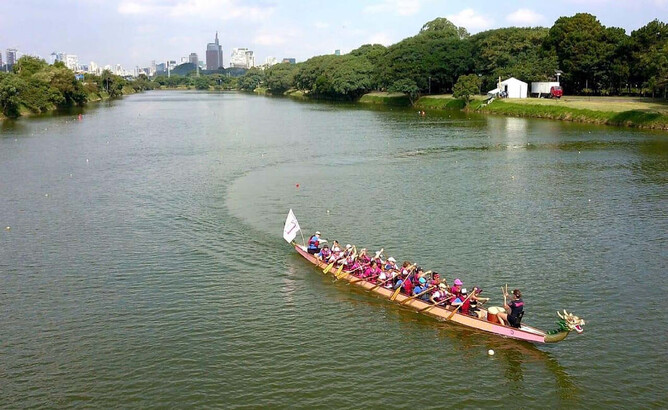Meri Gibson, President IBCPC, met with Nigel Bedford, Chair IDBF Para Athletes Commission over a video call (aided by the trifling matter of some 19,000km between Christchurch, New Zealand and London, England!).
First of all, tell us a bit about the Para Athletes Commission and how it fits in with other IDBF activities.
The IDBF Para Athletes Commission (IDBF-PAC) replaced the Adaptive Paddlers Commission in 2017. IDBF wanted the Commission’s name and terms of reference to reflect better both its drive for greater inclusivity within our sport (particularly for those with ‘invisible’ impairments not needing equipment adaptations) and external recognition.
‘Para Athletes’ is a term readily recognised across international sport, whether that be basketball, skiing, swimming, or rowing etc. Having this formal name for the Commission means its purpose is easily understood even by those with no real insights into the sport of dragon boating. We consider it therefore as a descriptor that is mainly used for non-dragon boat audiences.
‘Paradragons’ on the other hand is an intimate term used by the dragon boat community to refer to the race category, and to the paddlers, involved in Paradragon racing. It differentiates without being pejorative or judgemental. Within IDBF, we prefer to use ‘Para dragons’ every time.
The key and first task given to the Commission was the development (and subsequent management) of rules to govern Paradragon racing. Rules that would allow people living with any impairment to somehow race, fairly, against others (probably living with different impairments!). This was no easy task but we managed it and we published draft rules in 2018. These were put to the test in 2019 at the European Club Crew Championships – very successfully I might add – and formally adopted as apart of IDBF’s suite of competition regulations in 2020. Of course, these rules will continue to evolve but we now have a solid foundation on which to build.
The Commission has also been tasked with creating the environment for greater participation by Paradragons. To do this, we have worked hand-in-glove with the Competition & Technical Commission and the Executive Committee to ensure IDBF competitions do everything they can to encourage entries and racing. We have also produced a handy guide aimed at club coaches who might have one or more Paradragons within their membership.
Finally, and most recently, we have secured agreement from IDBF to have a Paradragon webpage within the IDBF website. Content is being developed now and the launch is imminent!
I imagine our readership will be interested to know if you consider Breast Cancer Paddlers (BCP) aspects in your work?
I have come prepared for that one! Right from the start my Commission recognised that the BCP community was already very well established and that IBCPC was, in many regards, leading the way in how our sport should work with impairments. You already had an incredibly strong network of clubs around the world, and were running terrific competitions. So, we quickly and easily decided that, although breast cancer is clearly an impairment (which would qualify someone to be a Paradragon) we would not even dream of trying to become involved in the excellent work that was already happening. Indeed, our original ‘Framework Rules’ (the draft rules issued in 2018) stated: IDBF-PAC felt that Breast Cancer Survivors (BCS) already had a well-established race category, and this should not form part of the IDBF-PAC remit unless the BCS community wishes, or IDBF directs, otherwise.
But, for the avoidance of any doubt, a BCP paddler would be eligible (and welcome!) to compete as a Paradragon if he or she wished, and the score we would give to their degree of impairment would be decided on a case-by-case basis.
If a BCP paddler did want to get involved with Paradragons, how would they do it?
There are two aspects to this. First of all, there’s training and then there’s competition. There are already a lot of clubs worldwide that are specifically for BCP paddlers but if these are not easily accessible to an individual because of location, then I would hope that any dragon boat club would welcome them with open arms. Existing BCP clubs also provide an easy way to participate in competitions, whether these are solely for BCP clubs or part of a larger national or international event (like IDBF’s Club Crew World Championships).
But a BCP paddler could also compete in a Paradragon race category. Although there are an increasing number of clubs around the world that are pure ‘Paradragon’ clubs (just like there are BCP clubs) their numbers are smaller. However, IDBF currently welcomes entries at its events from ‘temporary’ or ‘virtual’ Paradragon clubs that are only constituted for the purposes of participation. In this way, individual Paradragons from different clubs can band together to form a team for an IDBF competition. IDBF has decided to relax its rules in this area for the time being so as to encourage greater Para dragon involvement.
So, if a BCP paddler wasn’t able to race with a BCP club at the highest international level, they could do so as a Paradragon.
What sort of health & safety measures are needed to accommodate various impairments?
Health and safety are a shared responsibility and has to be paramount in the minds of the individual paddler, his or her club, and with the event organisers. Paradragons is about the participation by people with any impairment, so individuals’ needs can be myriad.
From an IDBF event-management perspective there are probably three key considerations: land environment, water safety, and equipment adaptations. The first is about ensuring that the athletes’ village has appropriate facilities, marshalling can be done in a way that is sensitive to particular impairments, and boat access, loading and unloading arrangements are suitable.
The second has issues around whether to mandate the wearing of buoyancy aids (I would like this always to be a decision made based on the situation, and not a rigid rule), sufficient safety boats on the racecourse, and whether to require unimpaired paddlers to be in a crew regardless of the race category.
Finally, any equipment adaptation must satisfy two requirements: it must not compromise the safety of the paddler or anyone else (particularly in the event of a capsize), and it must conform to IDBF’s rules.
Why do you think dragon boating particularly helps those with impairments?
That’s a really good question. I think the answer probably has two dimensions. First of all, the exercise that dragon boating delivers can be very beneficial; it can help recovery, boost personal fitness levels, and promote a healthy style of living. Of course, medical advice should always be sought first to ensure that the type of exercise associated with the sport is suitable for the impairment the person is living with. But, for most people, the sport can provide an excellent source of exercise that can deliver tangible long-term benefits.
The second dimension is, to me at least, probably more important and that is the improvements in someone’s sense of self-esteem and self-efficacy that can come from being part of a team and achieving goals of some description. Impairments can generate feelings of, amongst other things, hopelessness, self-pity, fear, even uselessness and these can cause people to disengage from others. Dragon boating can bring a sense of purpose, a sense of belonging, a sense of achievement and these can do more for someone than just an improvement in fitness.
For me, the icing on the cake is IDBF’s determination that anyone, impaired or unimpaired, can compete at the same international competition – there are very few other sports anywhere that offer that.
What do you consider most important, participation or competition?
Now that’s a hard one! For some, participation is simply a route to competition, and it is competition for them that presents the greater challenges and the best environment for achievement. For others though, simply being able to participate is itself a massive achievement. The PADS Dragon Boat Team in the Philippines is a proper Paradragon club. Their motto is Don’t let anybody tell you: “you can’t”.
Just being able to show that you “can” complete one lap of a small lake in a dragon boat could generate a sense of euphoria that is beyond words for that individual, and probably beyond the comprehension of most outsiders – you don’t always need competition and medals to achieve something remarkable.
What next for Para dragons?
More and more participation! Let’s provide an environment and a sport that welcomes those living with impairments and offers them opportunities (if they so want) to compe
te at the highest level of our sport. In doing so, I hope we can enrich their lives and also the lives of everyone else involved in our sport. In short, inclusion.

